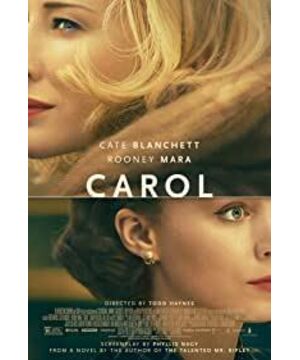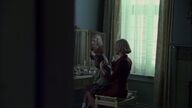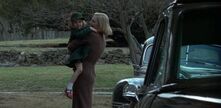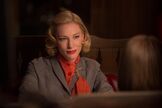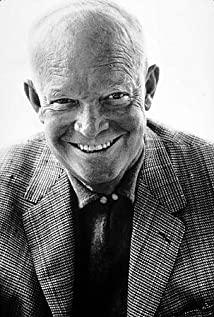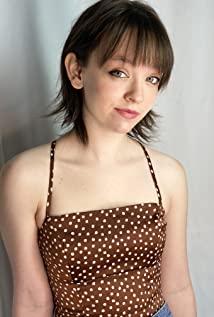CAROL is known as the most beautiful love movie of the year, and it deserves it. Its beauty is visual—actors, photography, lighting, costumes, music, art—all of which are beautiful; its beauty is even more emotional, and it awakens many people’s long-sleeping feelings of love—love is A missed beat of the heartbeat (Highsmith wrote in the original: (Therese) heard her heart stumble to catch up with the moment it had let pass.). It is undeniable that CAROL's widespread attention is largely due to the same-sex theme, but I believe that true love transcends gender. The audience empathizes with the young Therese in the story or the mature and charming Carol, not because he also loved a same-sex, but because he once loved someone. I agree with what Todd and Cate said over and over again in interviews, that CAROL is a love movie first and a gay love movie second. Two people met in the vast sea of people, fell in love at first sight, and decided to live together after their inner struggles - a perfect love in the world is probably the case.
The story is about Christmas Eve. Therese, who works in the toy department of a department store, fell in love with a married lady Carol at first sight. At that time, Carol and her husband were fighting for custody of their daughter. Carol's husband sent a private detective to track Carol and Therese to get evidence. Threatening Carol, Carol had to break up with Therese, but voluntarily gave up custody of her daughter during mediation out of court because she was unwilling to deny the fact that she and Therese were in love. For director Todd Haynes, the most difficult thing was how to convert the massive psychological descriptions in the original book into images. He did it, and it couldn't be better. There was no Wong Kar-wai-style narration to express the psychological activities, but countless details. ——Carol's hand on Therese's shoulder, Carol's red nail polish, the water vapor on the car window, Therese writing Carol's name stroke by stroke, Therese looking for the smell of Carol on Carol's blue sweater... A lot of people say it's thanks to Todd's sexuality that he understands women better than women, but in the end it's not about gender, it's about understanding love.
The photography perfectly interprets the director's intention. The camera movement is as gentle as stroking a lover's skin, and with the music that always appears just right when he is dissatisfied, the moisturizing things silently render the atmosphere of love. When Carol and Therese met for the first time, there was a glimpse of the crowd. The people between them disappeared in an instant. Carol came to Therese's counter, played the conversation between the two, and patted Carol up. Shoot Therese overhead to reinforce the class difference between the two. Carol turns around and leaves the counter after buying the toy. The camera starts to move slowly. Therese stares at Carol's eyes, and the back of Carol leaves. We know that love is so budding. The photographer uses the glass to shoot Carol and Therese to express the obstacles and ambiguity between the two, uses the foreground of the closed figure to frame the two together to express the character's situation, and uses the camera behind one or even two doors to compress the actors. The performance space is used to increase the emotional tension, and the pan, track and dolly are chosen slowly to trigger the resonance of the audience. Every camera movement is full of emotion.
Highsmith's text is so contagious, telling a love story that is too simple to be more terrifying. This "thrilling" does not come from the ups and downs, but from the surging emotions, so that the adaptation of screenwriter Nagy is doomed to impossible. Very brilliant, but fortunately she still wrote a lot of wonderful dialogue. I love that the writer found a new metaphor for the toy train in the department store: Everything comes a full circle. In the original it was: It was like something gone mad in imprisonment, something already dead that would never wear out. With imprisonment In contrast, full circle is more optimistic. What has changed is the character of Therese. In the original book, she is inferior, suspicious, and vulnerable, and constantly asks Carol for a sense of security. In the movie, although she still has low self-esteem in front of Carol and doesn't know how to reject anyone, she is still very much in the dark. Trusting Carol and trying to give Carol a sense of security makes the character all the more distressing. In one scene, Therese accidentally found a gun in Carol's suitcase. She thought Carol was insecure with her, so she took an opportunity to tentatively ask Carol: "Do you feel safe? With me, I mean." She even said, "If you're insecure, you must tell me." Carol replied: "I'm not frightened." Here we have to applaud the screenwriter's pun. A similar wonderful dialogue is in the character building phase at the beginning of the film, when Therese’s boyfriend Richard asked her about a trip to Europe when she was riding her bike to work, and Therese’s answer was “It’s too cold, I can’t think straight.
The setting of the other main character Carol in the story has not changed much, probably because the original book is told from Therese's point of view. Carol's image is originally blurred. The Carol we see is only Carol in front of Therese. Carol knew almost nothing. But Carol in the original seems to be more restrained and more insecure at the same time. She is strong on the surface, but she is always testing Therese and dare not take further action lightly. At first glance, Carol played by Cate was so strong that she was almost domineering. She interrupted Therese's words, made decisions for Therese, and even gave Therese gifts. But paying attention to the details in Cate's performance captures evidence of her love for Therese. In the 98th minute of the film, Cate's best performance since filming, Carol had broken up with Therese. She was sitting in the car and was about to settle out of court with her husband when she suddenly leaned closer to the car window-she saw Therese, a A completely different Therese, she seemed to have grown from a child to an adult overnight, and Carol kept watching Therese, watching her cross the street, watching her go to the other side of the street, watching her fade away, Carol's expression changed from The surprise when I first met, transitioned to the appreciation of the reborn Therese, and then to the love of her lover. The infatuation in her eyes was just like every time Therese looked at her before. The whole world disappeared, Only you are left. At this moment, the perspective of the story changed, and the audience became Carol. We saw Therese in Carol's eyes, and we also experienced Carol's inner struggle. At this moment, she decided not to deny her relationship with Therese, even if it meant losing daughter. Immediately afterwards, Carol's back appeared in the elevator, she turned to face the audience, and she opened the door that would change her life. When her lawyer tried to deny the veracity of the tapes provided by the private investigator, Carol cut in forcefully, saying that she would not deny the affair between her and Therese, Carol's emotions were like icebergs hiding under the sea The part we can't see, but it's quietly starting to unravel, and Carol puts her hands on the table, trying to hold back her emotions, as she always does, re-breathing and saying she's willing to give up her daughter's custody Quan, the lawyer interrupts Carol excitedly, demanding Suspended the meeting, Carol almost choked up, but she tried to express her demands clearly in a calm tone, she would fight for visitation rights at all costs, Carol said the last sentence, her emotions also reached the brink of collapse, she could no longer If you say one more word, the tears will burst. She is unwilling and will not cry in front of her husband. From beginning to end, she speaks with her head slightly raised, and her husband does not even dare to face her. I almost forgot to breathe while watching this scene, and when Carol walked out of the conference room, the suffocating drama was dissipated by the New York street scene and soothing music that followed, and I couldn't help wow.
Abby was an unpleasant character in the original book, but the adaptation made me really like this character. She and Carol have known each other since they were ten years old, childhood sweethearts. Carol had a relationship with Abby before meeting Therese, and their relationship ended after a period of time. The reason for the breakup is not explained in the movie, Abby just said "It changed. It's nobody's fault." I guess the reason is that Carol's husband found out about their relationship, and Carol was unwilling to give up her family and daughter for Abby's sake , but meeting Therese everything changed. Abby also loves Carol, but this kind of love is no longer necessary to get the other party's selfish love. She is by Carol's side. When Carol is most desperate, she is the person Carol trusts the most. Carol can be disheveled and disheveled in front of her. , complaining incessantly. There was a scene where Abby went to visit Carol. When he was about to leave, Carol grabbed Abby's hand and stood up. Abby hugged Carol's waist, and Carol's hand held Abby's arm behind his back. This scene was deeply moved. I. It was Abby who pulled Carol out of the swamp of despair. She couldn't have Carol, but she wanted Carol to be happy. Carol's husband couldn't have Carol either, but he wanted to take Carol's happiness away.
The adaptation turns the structure of the story into a flashback, echoing the beginning and the end, which is exactly the metaphor of the little train: Everything comes a full circle. At the beginning of the film, Carol and Therese are drinking tea in a restaurant, using a long-range performance, it is difficult to hear the two What exactly was being said, the conversation was quickly interrupted by one of Therese's friends, Jack, Carol got up and put on her coat and was about to leave. Before leaving, she put her right hand on Therese's shoulder, Therese looked down at Carol's hand, her chest was wide open. Ups and downs, then Carol leaves, Jack goes on the phone, Therese sits alone, with her back still up and down, a quiet but powerful shot, but the audience doesn't know what's going on. Until the end of the film, we hear their conversation, Carol said she rented an apartment big enough for two people and got a job, she said to Therese "I was hoping you might like to come and live with me" , but I guess you won't.
It's a pity that the script deleted all the things that Therese went through alone in the West after Carol returned to New York, such as seeing the oil painting in the library that reminded her of her childhood and Carol, such as she refused Carol's check and had to find someone else. For example, Dannie happened to stop by to visit Therese, for example, Therese drove Carol's car back to New York alone... This is the process of her growing up, she didn't grow up overnight, and it wasn't that she suddenly got armor, She felt betrayed by Carol, she hated Carol, but if everything went back to the beginning, she would still love Carol - not another woman, but Carol.
The original reads at the end: It was Carol she loved and would always love. Oh, in a different way now, because she was a different person, and it was like meeting Carol all over again, but it was still Carol and no one else. It would be Carol, in a thousand cities, a thousand houses, in foreign lands where they would go together, in heaven and in hell. A different way because she's not who she was anymore, it's like a whole new she meets Carol again, but it's still Carol, not someone else. They'll go through everything together, even in heaven and hell They can't be separated, and there's only one person who makes her willing to do so - Carol.)
I think more audiences will take the role of Therese, not only because the film is narrated from her point of view, but also because her love for Carol is easy to understand, but Carol's love for her is vague - the first meeting deliberately dropped gloves She seems to have ulterior motives. After arguing with her husband, she treated Therese badly. She took the initiative to push Therese down. After falling asleep, she left early the next morning. She asked her ex-girlfriend to hand over the breakup letter, and she hung up Therese without saying a word. All kinds of behaviors can't be called a good lover, and some people even say that if this story is told again from Carol's point of view, it may not be a good love story. But the life of a woman in her thirties, with a husband, and a daughter is something Therese has never experienced and can't imagine. Therese is the second woman Carol has ever loved, and she knows better what she might lose once invested. , so she is more insecure than Therese, but because of age, class, experience, etc., she has to be strong enough to protect Therese. So who will protect her? Her husband can't, can Therese? We've all truly loved someone, and we've all experienced a relationship or even a few moments where our instincts for self-preservation backed down, but none of us can deny that those moments of love were real.
The story does not set the main obstacle between Carol and Therese as external social pressure (of course there must be such pressure), but internalizes the choice between the two people, which allows CAROL to discuss on a broader level love. In addition to the fact that they are of the same sex, they also face differences in age, class, growth background, and life experience. The difficulty is not falling in love with a same-sex, the difficulty is falling in love with each other, and the difficulty is being firm for love.
Love can make a vulnerable person strong and a strong person vulnerable - it's incredible.
View more about Carol reviews


